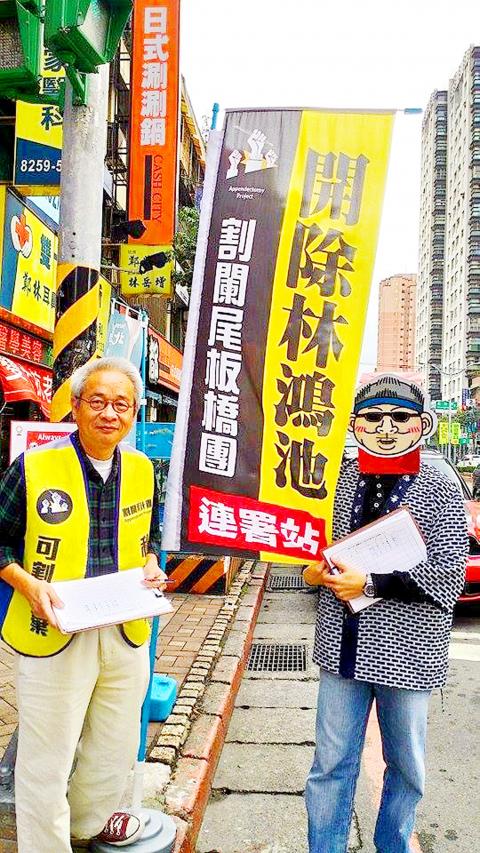With the petition to recall Chinese Nationalist Party (KMT) Legislator Alex Tsai (蔡正元) already submitted, activists from the Appendectomy Project have now turned their efforts to the two other campaigns to recall KMT legislators Wu Yu-sheng (吳育昇) and Lin Hong-chih (林鴻池).
With the deadline to submit the petitions on Friday, the project redoubled its efforts in the New Taipei City constituencies of Wu and Lin over the weekend.
In order to attain the required 13 percent threshold to launch a recall referendum, the project must garner the support of 37,469 signatories in Wu’s constituency of Tamsui/Sanjhi (淡水/三芝) districts, and 27,677 in Lin’s Banciao (板橋) constituency.

Photo: Courtesy of the Appendectomy Project
Project activists said more than 5,000 signatures were collected in Banciao on Saturday thanks to volunteers who canvassed several traditional marketplaces. However, the project has collected less than half of the required signatures to recall Lin.
It has had better luck with the petition to recall Wu, with nearly three-quarters of the required signatures gathered.
The petition to recall Tsai, which passed the required threshold last week, is now under review by the Central Election Commission, which has 40 days to verify the information provided by the petitioners. If it validates the petition, a recall referendum is likely to be held before the end of February.
The name Appendectomy Project was chosen because the term for pan-blue camp legislators in Mandarin Chinese, lan wei (藍委), is pronounced the same as the word for “appendix” (闌尾).
The project said it targeted the three KMT lawmakers because they adhered to President Ma Ying-jeou’s (馬英九) instructions rather than the public’s wishes.

Taiwan is stepping up plans to create self-sufficient supply chains for combat drones and increase foreign orders from the US to counter China’s numerical superiority, a defense official said on Saturday. Commenting on condition of anonymity, the official said the nation’s armed forces are in agreement with US Admiral Samuel Paparo’s assessment that Taiwan’s military must be prepared to turn the nation’s waters into a “hellscape” for the Chinese People’s Liberation Army (PLA). Paparo, the commander of the US Indo-Pacific Command, reiterated the concept during a Congressional hearing in Washington on Wednesday. He first coined the term in a security conference last

Prosecutors today declined to say who was questioned regarding alleged forgery on petitions to recall Democratic Progressive Party (DPP) legislators, after Chinese-language media earlier reported that members of the Chinese Nationalist Party (KMT) Youth League were brought in for questioning. The Ministry of Justice Investigation Bureau confirmed that two people had been questioned, but did not disclose any further information about the ongoing investigation. KMT Youth League members Lee Hsiao-liang (李孝亮) and Liu Szu-yin (劉思吟) — who are leading the effort to recall DPP caucus chief executive Rosalia Wu (吳思瑤) and Legislator Wu Pei-yi (吳沛憶) — both posted on Facebook saying: “I

Sung Chien-liang (宋建樑), who led efforts to recall Democratic Progressive Party (DPP) Legislator Lee Kun-cheng (李坤城), was released on bail of NT$80,000 today amid outcry over his decision to wear a Nazi armband to questioning the night before. Sung arrived at the New Taipei District Prosecutors’ Office for questioning in a recall petition forgery case last night wearing a red armband bearing a swastika, carrying a copy of Adolf Hitler’s Mein Kampf and giving a Nazi salute. Sung left the building at 1:15am without the armband and covering the book with his coat. Lee said today that this is a serious

Firefighters are working to put out a fire on Taipei’s Yangmingshan (陽明山) reported earlier this morning. The cause of the fire is still under investigation. The Taipei Fire Department said it received a report of a fire at Xiaoyoukeng (小油坑) at 11:17am, dispatching four command vehicles, 16 firetrucks, one ambulance and 72 personnel. The fire is still burning on about 250m² of land, according to initial estimates, as eyewitnesses reported seeing smoke rising from the mountain. The Yangmingshan National Park Headquarters on Facebook said the Qixingshan (七星山) hiking trail starting from Xiaoyoukeng and the Xiaoyoukeng parking lot are closed as firefighters work to put